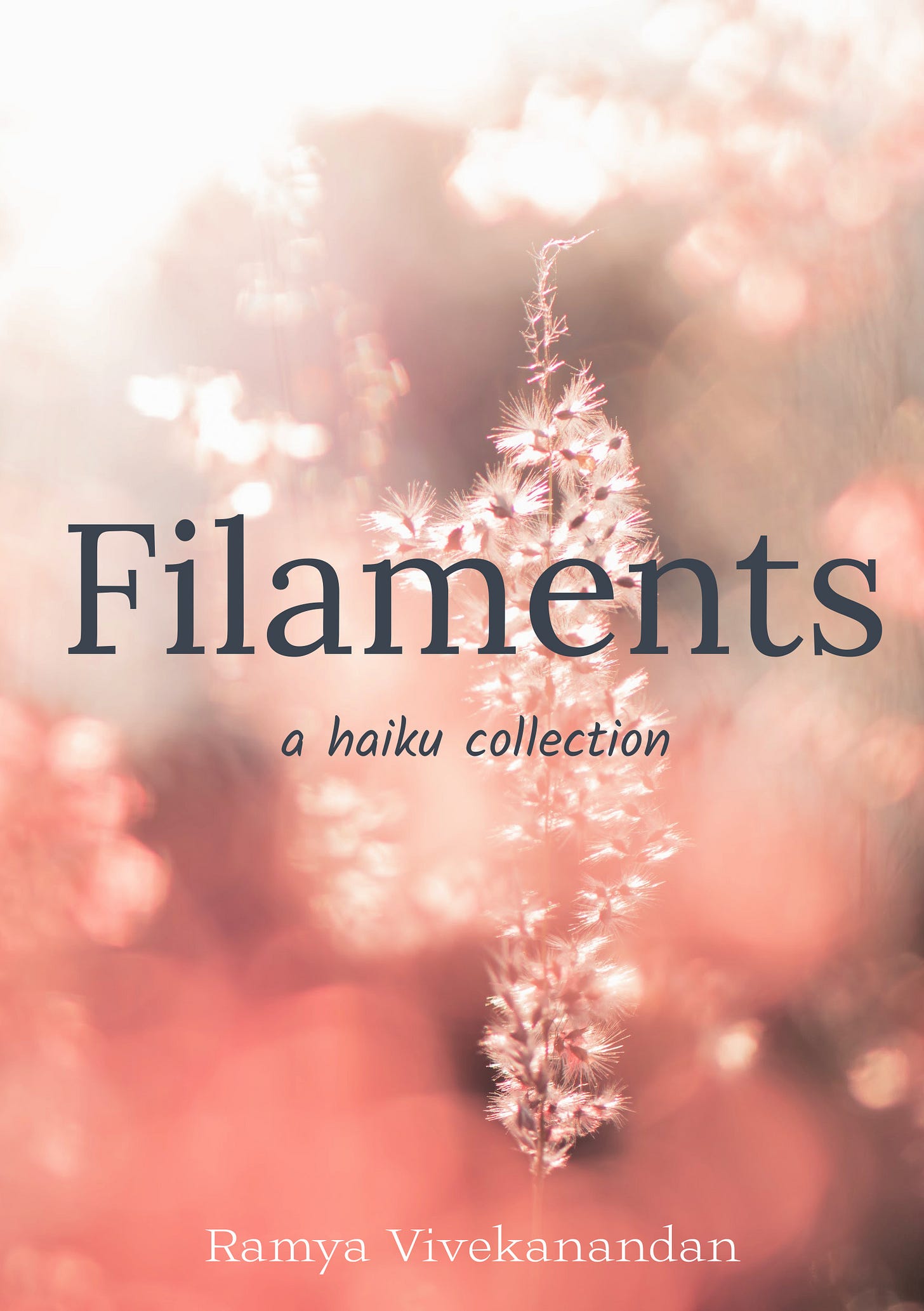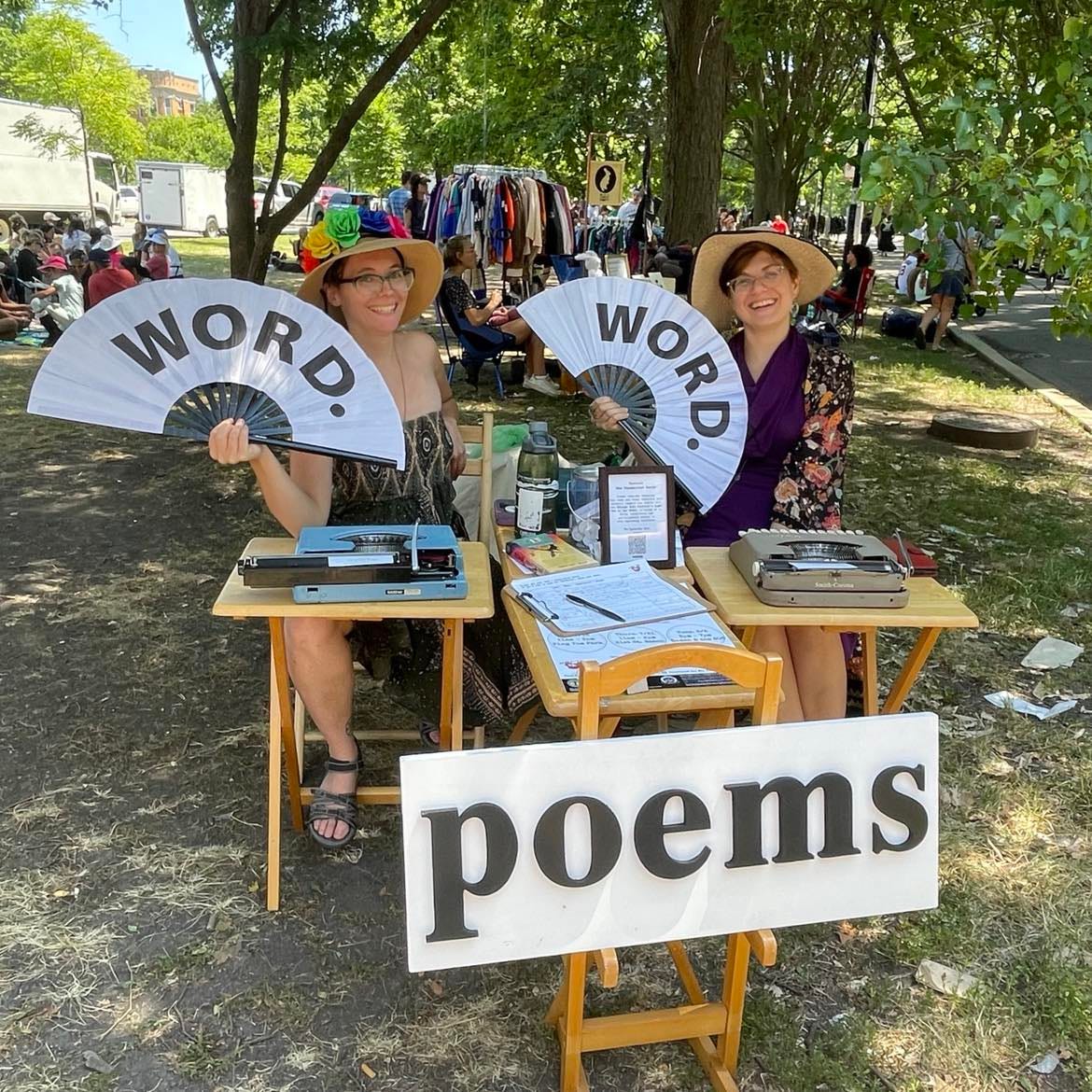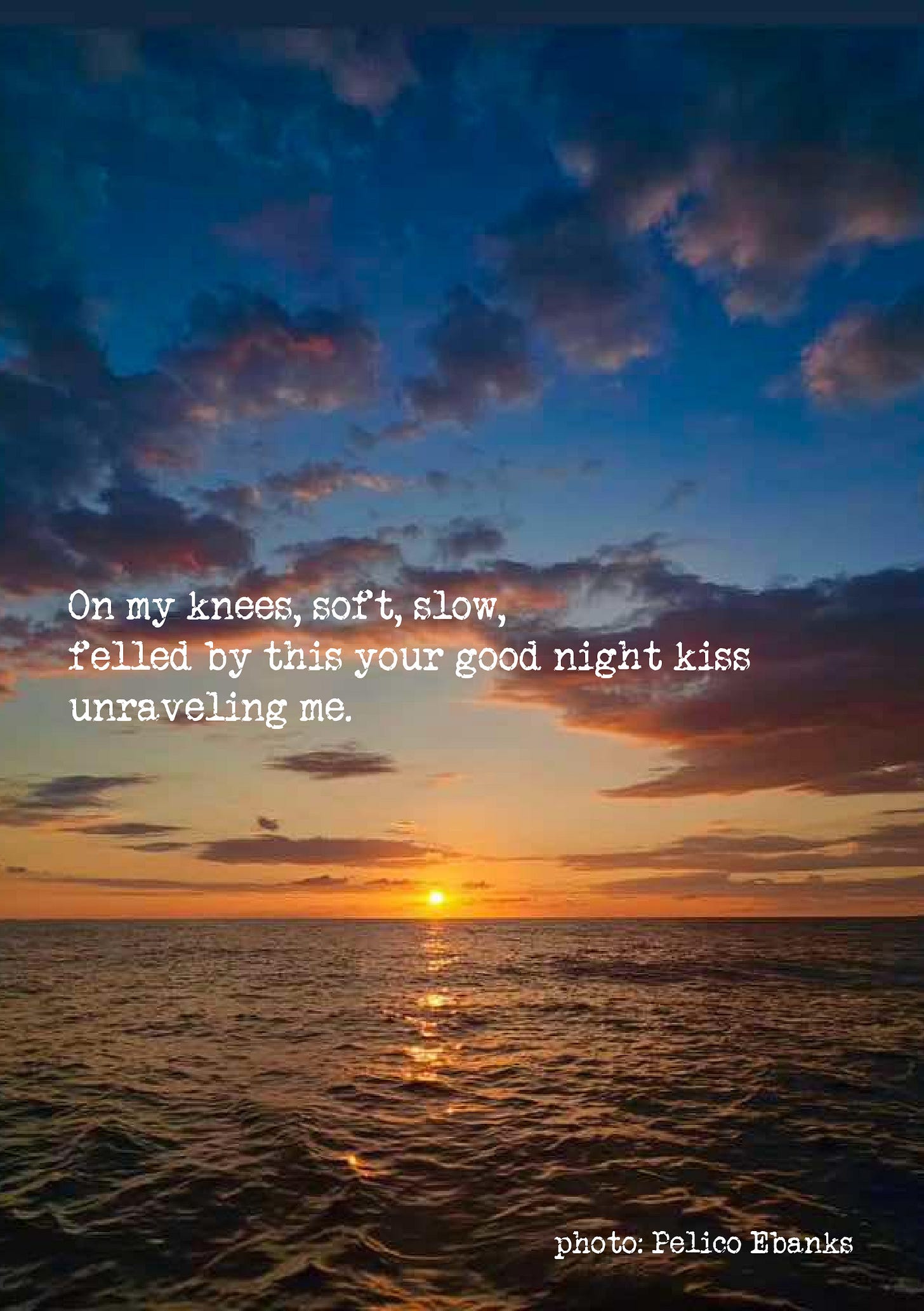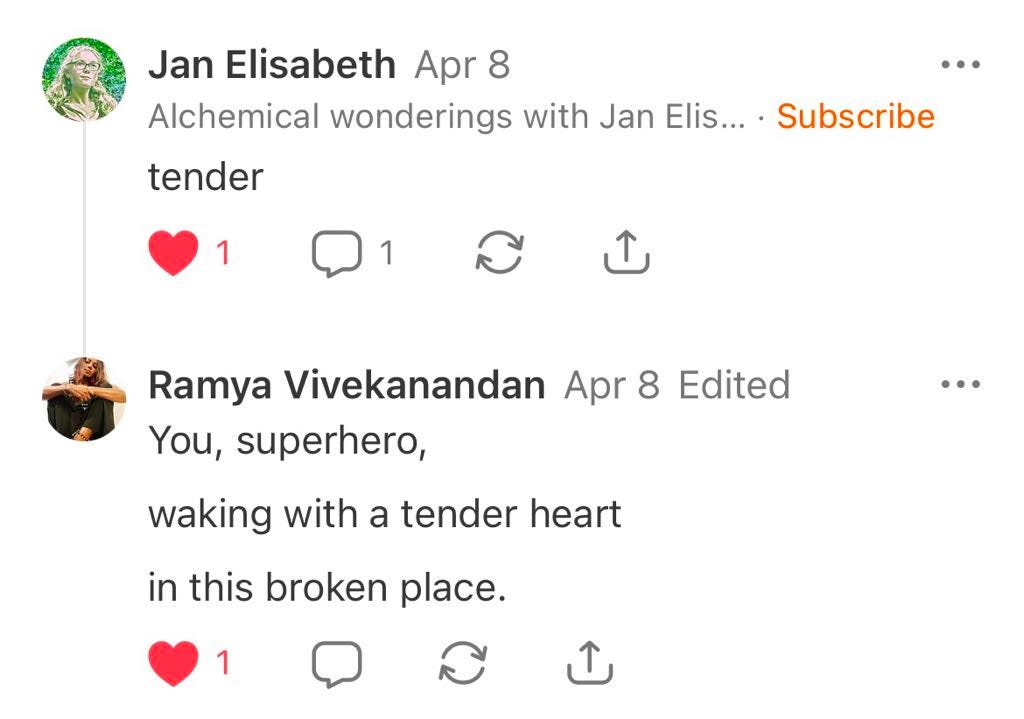National Poetry Month has come to a close in the U.S. and so has my monthlong project of writing haikus. I told you about it a couple of weeks ago. The idea was to solicit “submissions” of a word, image or song from my readers and Substack peers and to then write a personalized haiku in “response” to each one.
Haiku—the Japanese poetic form consisting of three lines of (typically) 5-7-5 syllables respectively—is one of my favorites. The precise structure provides both challenge and guardrails, and the sparse verbiage means that every word is precious. In this way, haiku is neat, bare and pulses with life.
Thanks to your generosity, I’ve written about 50 haikus as part of this endeavor. It’s been great fun, and as mentioned I’ll be compiling (most of) them into a self-published e-chapbook, which will be free for all paid subscribers as well as those who made a submission. For everyone else, it’ll be available for a nominal fee of (likely) $5.
I’ll be sharing more details on the chapbook and how you can get it soon, so please make sure to subscribe to Assemblage if you don’t already (with much gratitude). Stay tuned also as I revamp my ‘About’ page and other parts of my Substack DNA, soon. Exciting things are coming!
But today, what I want to tell you is that the practice of writing these haikus was a revelation. More than the poems themselves, the act of connection—between each person who submitted a prompt and myself— opened my eyes in ways that I hadn’t anticipated.
It’s not surprising though, not really. In a love note I penned to the practice of writing last year, I wrote:
“Writing is an act of care. Of seeing and being seen. Bearing witness…And interestingly, poetry seems to be the most resonant filament. Maybe it’s the alchemy that it entails – between imagery, rhythm, meter and meaning – that makes this medium particularly open to personal interpretation and connection on the part of the reader.”
The haikus that were rendered through this give and take are in fact just that: filaments. Between those who shared and I, surely, but between all of us, ultimately.
And if poetry can do that, then maybe there’s hope for us after all.
A peak behind the veil
As I wrote in introducing this haiku project, the idea behind it came from experiencing the Typewriter Tarts in Chicago’s Logan Square Farmers Market. They’re a duo of poets who are set up with typewriters at the market (and other spaces) and write poems on-demand in response to key words you share (for a suggested donation of $25). I thought the idea was brilliant: personalized poetry.
In fact, when you think about it, it’s not so different from other modes of energy exchange: tarot, palmistry, an Ayurvedic consultation, massage, reiki, to name but a few. But the “currency” here is words, and the specific vessel is poetry, as expressed through the form of the haiku.
Many have written about this particular power of poetry—its ability to give utterance to that which is in the ether, hitherto nameless. I’m reminded here of the words of poet Maggie Smith, who at the beginning of April was in conversation with Ron Charles at the MLK Jr. Central Library here in DC. It was around her brilliant new work on creativity, Dear Writer: Pep Talks & Practical Advice for the Creative Life. In it, she writes:
“Creativity, like marriage, dissolves boundaries. As if there’s a veil—of mist, of cloud—between writer and reader, I can reach through it to you. You can reach through it to me.”
For those of you who submitted something, maybe you didn’t realize this is what you were signing up for. Truth be told, neither did I.
In the first instance, you find yourself with a glimpse—even if the tiniest—into a person’s mind or vista or energy at a point in time. A peak behind the veil. I can’t be sure, but perhaps I got to see your gardens or the flowers you spotted—the orange and amethyst blooms—or the place where you take your morning walk. The creatures you encountered, a companion, the sunset on your shores.
Maybe your words conveyed something about the things on your mind or in your heart. Your wishes, your hopes. Things like wanderlust, bloom, tenderness, unity, reawakening, ease, love. Again, I can’t be sure, but perhaps it’s no small coincidence that I found myself nodding along as I wrote in response. In that way, the writing of these haikus felt like communion.
At the same time, perhaps your words—or in one case a song—channeled the feelings or simple moments of a person: nostalgia, uncertainty, headaches, guilt, recovery, grief, the quest to be true to yourself. Of course, one word (or image or tune) can never contain the complexity of our experiences. But I guess what I’m trying to say here is that any words that I managed to thread together in response flowed from a place of recognition.
We’re not the same, but ultimately, we’re all in this thing together.
A telescope to the rock experiences
In some cases, the submissions came from people I know — friends, family members, colleagues. Though not in all cases, I might have had an inkling of something that’s going on with you or perhaps chose to haphazard a guess. Even if I’m not the best at keeping in touch in a consistent way, your sharing gave me a telescope, in a sense. At least that’s the way it felt. Like some access granted. Intimacy. A privilege.
The same is true regarding the several Substack peers who contributed, many of whom I’d never read or encountered before. Discovering your work and your worlds has been one of the great joys of this project—one that I didn’t anticipate! This part was greatly supported by some communities I’m a part of on the platform, including
’s wonderful Substack Writers at Work and her Notes Boost Challenge, which was an amazing conduit for connection.Without the context of a relationship off the page (and Substack) in these cases, the best I could manage was to do a bit of “homework” (to use
’s words) and then veer towards what felt shared, what felt universal.This part in particular felt like play. Fizzed like a kind of chemistry. To tell it now, it reminds me of one of my favorite lines from Audre Lorde’s oft-quoted “Poetry Is Not A Luxury”:
“Poetry is the way we help give name to the nameless so it can be thought. The farthest external horizons of our hopes and fears are cobbled by our poems, carved from the rock experiences of our daily lives.”
In this case, you’ve given me access—even if only just a little peak—to your “rock experiences.” And in the space of what I like to think of as a poetic conversation, together we’ve melded something new. Given name to the nameless.
Connective tissue—an act of service
More than anything else, my month of penning haikus reminded me that poetry is connective tissue. A conversation between the particular and the universal. The profane and the holy. Filaments—thus the title of the upcoming chapbook.
As I get ready to birth this baby—my first poetry collection (unless you count the one from 2nd grade)—into the universe, I’ve come to a new understanding of the potential of poetry as an act of service. An exercise in attention, which after all is a form of love. After a lifetime of doing “mission-driven” work in service to the world (at least on paper), I’ve realized that it’s neither a departure nor a leap of faith to wield the pen now in this way, in the hope of making a contribution.
To hopefully give someone pause, even if only for the timespan it takes to read 17 syllables. The feeling of being seen. A small generosity. Something that feels beautiful or light or calming, whichever might be needed. What I’ve learned this month is that this is the part that I want to lean into—the connective tissue.
The words of poet, essayist and children’s book author Frederick Joseph resonate strongly here:
“If I am to leave a legacy from my time here, may it be a kingdom of words, where poems stand as colossal monuments to our joys and pains.”
In closing my month of haiku, I’d love to explore how my own “kingdom of words” can include a more sustained practice of personalized or customized poetry, in the vein of the last 30 days. Similar to the Typewriter Tarts, I’m aware that there are poets who write in this way at weddings and banquets and the like, while there’s also a long-standing tradition of commissioned poetry. I’m at the very beginnings of my exploration of these avenues, so please let me know if you have any ideas or suggestions – I’d very much appreciate it.
And soon come for Filaments—an assemblage, a tapestry, threads—between you and me, between all of us.











filaments is a cool name for this project
I'm behind in reading my favorite publications, and I'm so sorry I missed your haiku invitation, Ramya. What a glorious project! I love writing and reading haiku. It helps ground me, make me pay more attention to the holy that surrounds me, and lift my spirit.
Congratulations on your work, Filaments. It's a gorgeous name.